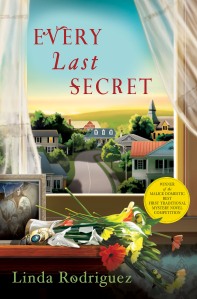What Makes A Good Writer’s Group by Linda Rodriguez  author of Every Last Secret – winner of the (St. Martin’s) Malice Domestic Best First Traditional Mystery Novel Competition
author of Every Last Secret – winner of the (St. Martin’s) Malice Domestic Best First Traditional Mystery Novel Competition
Over the years, I have been a part of many writer’s workshops, groups, and organizations. I have been a founder of several. When I was a young wife and mother, I desperately wanted the companionship of other writers, other people who understood this difficult thing I was trying to do.
Since those days, I have developed many wonderful writer friends who truly understand this difficult thing I still try to do. Better yet, I am now married to a writer-editor and have a son and foster-son who are talented writers. I also belong to four writer’s organizations that I helped found—The Writers Place, Latino Writers Collective, Border Crimes, and The Novel Group—three that I had no part in developing but still love and support—the Macondo Writing Workshop, Wordcraft Circle of Native American Writers and Storytellers, and Con Tinta.
Before these groups, there others that were not so helpful or successful, a series of undergraduate and graduate writing workshops, a group of activist writers putting out an underground newspaper (back in the day of underground newspapers), a short-fiction critique group, a freelance writers group, a novel critique group, and even a romance writers group. So I have broad experience with writer’s organizations and groups.
One of the key elements of a good writer’s group, whether it is nationwide like the Macondo Writing Workshop, citywide like The Writers Place, or just a few writer friends like The Novel Group, is respect, respect for the group, for the other members and for the purpose of the group. Respect involves giving honest and helpful criticism without making it hurtful or personal. Respect involves valuing the distinctive differences of each member, as both a writer and as a person, appreciating what those unique qualities bring to the group as a whole.
Another hallmark of a good writer’s group is enthusiasm. Good groups are excited about writing and the writer’s life. When members grow discouraged, they can come away from a meeting of their group re-energized and back in touch with their passion for writing.
If a writer’s group or a subset of the group functions as a critique group, it is important for all the writers in the group to be writing at a similar level of experience and ability, otherwise the group will eventually fail as a critique group, no matter how congenial the individuals are. Often, however, beginners may be a part of a group led by an experienced author for a fee. This can be a good foundation—if the goal of both the leader and the members is for the members to outgrow the group.
What has your experience of writers groups been? If you have not been able to find one, would you consider starting one of your own?
~ ~ ~ ~

Linda Rodriguez’s novel, Every Last Secret (Minotaur Books), won the Malice Domestic Best First Traditional Mystery Novel Competition, was selected by Las Comadres Conversations With…, and was a Barnes & Noble mystery pick. The second book in the Skeet Bannion series, Every Broken Trust, will be published in Spring 2013. Linda reads and writes everything, even award-winning books of poetry and a cookbook, and she spends too much time on Twitter as @rodriguez_linda. She blogs about writers, writing, and the absurdities of everyday life at http://lindarodriguezwrites.blogspot.com.
I understand now why you belong to writers’ groups and why you enjoy them so much!!
Thanks, Rhonda. Do you have a writer’s group or have you belonged to one in the past?
I absolutely agree, Linda, that respect is crucial in any writers’ group. My own first rule of critique is that it has to be, first and always, only about the writing and never about the writer. Sometimes it’s hard not to take critique personally, so it’s incredibly important to be positive or at least neutral in the way you phrase things. And for a large writers’ group, critique is difficult; I think six is the optimum number for a critique group. Any larger and it gets unwieldy.
I’ll have to think about your assertion that all the writers in a critique group should be at the same level. I’ve learned a lot from other writers who I felt were much more accomplished than I was then, and am grateful that they gave of their time to help some struggling newbies learn more about their craft. I’m not sure THEY got a lot out of the group, but I certainly did!
Karen, you’re right about the size of critique groups. The larger they get, the less effective they tend to be. Three is about your minimum, and six makes a good maximum.
If most of the writers in a group are at a similar level, and one or two highly motivated writers at a lesser level join, it can work out fine still. If most of the group are at level C with their work, and one or maybe two are doing level A work, most of the benefit from critiquing will flow one way only. I’ve stayed in groups like that for quite some time when I really liked the people and enjoyed helping them along, but I’ve seen good writers stall out under such circumstances. I really do think critique groups work best for everyone when there’s a general balance in that regard.
Thanks for stopping by, Karen!
I totally agree with your points. My writing group came out of a novel writing class and we were drawn to each other for our helpful, honest critiques. Nine years later we are still going strong, started an author’s cooperative press, wrote a book together on writing groups and craft, and four of us have books in print (www.bridlepathpress). We couldn’t function without respect for each other and our craft.
Now, see, Marni, yours is a very balanced, productive writing group. Look at all you’ve accomplished together and what you’ve helped each other accomplish separately! Respect is just the bedrock. Congratulations on building such a fine group together!
Thanks for stopping by.
I belong to two writers groups. One for shorts and the other for novels. The short group was established before I joined. Its members have become successfull and have shared their knowledge and insight. It’s been great to be a part of and work with those authors. Although there are about 12 members, only about 6 are truely active, but that’s enough for everyone to get enough critiques and feedback to do the job. The novel critique group isn’t quite as tight. I think I need to find a new one, but I won’t go into details.
It sounds like you’ve had many successful experiences with writers’ groups, Linda. I hope to have more successes in writers groups because when its right, the members supportive, it may be all you need to move ahead.
Elaine, you’re absolutely right. When the group meshes well and members are respectful and supportive of each other, a writing group can be a real blessing. I’ve gone through my share of dysfunctional or just not very effective or useful writing groups in the past, though. Sounds like you need to find or create a new novel group but cherish and hold fast to the short fiction group.
Thanks for stopping by today, especially when you have so much conversation going at your own blog post. I appreciate it.
I haven’t been in a Writer’s Group in quite some time….though I’ve had a stable of “A” and “B” readers, but today, ironically, a Guppie SinC group that I signed up to be in came into existence. Should be interesting as none of the 4 of us in this e-mail based group know each other. I’m looking forward to it especially after reading your blog post, Linda. Thanks again for posting today.
Debra, I hope your new Guppy SinC group works out beautifully for you. My biggest problem at the moment is that none of the members of my critique group are under contract and trying to meet deadlines (though all three have published books). I’m having to write too fast for my group to be able to give me feedback all along the way. I still have my in-house reader, my husband the professional editor and publisher and my youngest son, an excellent first reader also. And my agent’s terrific, as is my editor. But I miss my novel group’s feedback. I still make meetings if I’m in town, and we’re still uber-supportive of each other. But I only get to run synopses and maybe the first couple of chapters by them before I’m too far ahead for them to catch up with once or twice a month meetings.
thanks for having me!
We should all have your problem…. needing to meet deadlines! Seriously though, after reading your blog about Writer’s Groups, I can see why you miss their feedback especially when you are having to write fast. I was reading a piece this morning that mentioned how the first drafts are getting the words down while the later ones are the true edits, but with deadlines, it would be nice to have some fresh eyes pointing things out to you that might be more obvious if you had a little breathing room. Still, having read Every Last Secret, I know that fast or slow, I can’t wait to read your next works.
Debra, yes, I’m a big believer in the first draft is getting the story and the characters down. The rewrites are where I get a chance to really make it the best I can. One thing, though is that, after years of critiquing with these fine women writers, I can hear their distinct voices in my head–Deborah’s fabulous eye for concision and logistics, Jacqueline’s for ways to enrich the character and background, Jane’s for what more a reader might want or need to know. I guess I’ve internalized my writing group. I hope I’ve given them as much, also.
I know I’m late to the party, but as the critique group coordinator for the Guppies, I just had to take a moment to comment on your great post, Linda. I think critique groups can be tremendously helpful when, as you and the commenters pointed out, there is a good balance. Balanced ability levels, balanced commitment and balanced enthusiasm. If one of these is out of whack for too long, things tend to fall apart.
That being said, I still believe that the online Guppy critique groups have proved to be very beneficial when everything clicks. Sometimes it can take a couple of tries to find the right mix, but the effort pays off in the end.
Betsy, you’re absolutely right. Where I’ve had critique groups that hit right away, they were among people who had known each other for years. Without that, it does take a little trial and error. I would suggest to anyone whose first critique group wasn’t a successful mix not to give up on the process.
I’m not a member of Guppies (because I didn’t learn about this great group until I already had a contract), but many of my friends are and sing its praises highly, as well as those of Guppy critique groups. Obviously, you are doing a terrific job in that regard, Betsy!
Thanks so much for stopping by to join in the conversation.